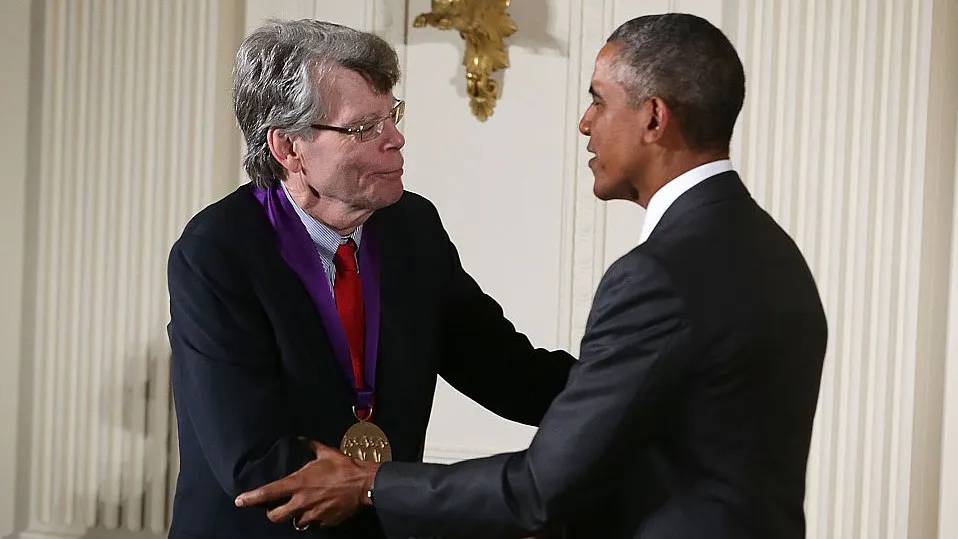Author Stephen King has decided to quit Facebook, objecting to the social media giant’s refusal to fact-check political advertisements.
King, 72, was a big user of Facebook, but deactivated his account on Friday.
In a weird, 21st century twist, King took to another social media platform, Twitter, to announce his departure.
“I’m quitting Facebook. Not comfortable with the flood of false information that’s allowed in its political advertising, nor am I confident in its ability to protect its users’ privacy. Follow me (and Molly, aka The Thing of Evil) on Twitter, if you like,” King wrote to his 5.6 million followers.
I'm quitting Facebook. Not comfortable with the flood of false information that's allowed in its political advertising, nor am I confident in its ability to protect its users' privacy. Follow me (and Molly, aka The Thing of Evil) on Twitter, if you like.
— Stephen King (@StephenKing) February 1, 2020
King, the author of “The Shining” and numerous other horror novels, was reacting to Facebook’s refusal to ban paid political ads. Facebook has also refused to fact-check political ads, which has also prompted others to leave the site.
Explaining its decision, Facebook wrote that “in the absence of regulation, Facebook and other companies are left to design their own policies. We have based ours on the principle that people should be able to hear from those who wish to lead them, warts and all, and that what they say should be scrutinized and debated in public.”
On the same day that King announced he was quitting Facebook, founder and CEO Mark Zuckerberg spoke at at the Silicon Slopes Tech Summit in Utah, vowing to support free speech. “Increasingly we’re getting called to censor a lot of different kinds of content that makes me really uncomfortable,” Zuckerberg said.
King follows another Hollywood icon, actor Mark Hamill, in leaving the social media giant. In January, he announced that he was quitting Facebook, also criticizing the company’s policy on political ads.
“So disappointed that #MarkZuckerberg values profit more than truthfulness that I’ve decided to delete my @Facebook account. I know this is a big ‘Who Cares?’ for the world at large, but I’ll sleep better at night,” he wrote — on Twitter. He hashtagged the post “#PatriotismOverProfits.”
So disappointed that #MarkZuckerberg values profit more than truthfulness that I've decided to delete my @Facebook account. I know this is a big "Who Cares?" for the world at large, but I'll sleep better at night. #PatriotismOverProfits 🇲🇾>💰 https://t.co/seb2eJMTo6
— Mark Hamill (@MarkHamill) January 12, 2020
In his tweet, Hamill linked a New York Times story about Facebook’s decision. Rob Leathern, Facebook’s director of product management, defended Facebook’s decision to accept all political ads, telling The Times, “Ultimately, we don’t think decisions about political ads should be made by private companies.”
“In the absence of regulation, Facebook and other companies are left to design their own policies. We have based ours on the principle that people should be able to hear from those who wish to lead them, warts and all, and that what they say should be scrutinized and debated in public,” Leathern said.
Other high-profile figures who have deleted their accounts include the singer Cher, comedian Will Ferrell, actor Jim Carrey and Apple co-founder Steve Wozniak.
“Borat” actor Sacha Baron Cohen criticized Facebook in a November speech as he accepted an award from the Anti-Defamation League, saying that if Facebook had existed during Adolf Hitler’s reign atop the Third Reich, he could have posted “30-second ads on his ‘solution’ to the ‘Jewish problem.’”
Facebook fired back, saying Cohen “misrepresented Facebook’s policies” because Facebook bans hate speech.
While Hamill may have quit Facebook, he remains active on Twitter and Instagram (which, by the way, is owned by Facebook). Twitter, though, has banned all political advertisements from its platform, with the company’s chief executive Jack Dorsey tweeting that he believed “political message reach should be earned, not bought.”

.png)
.png)

